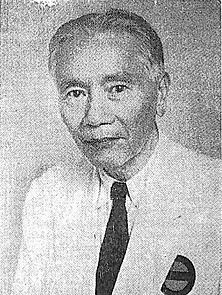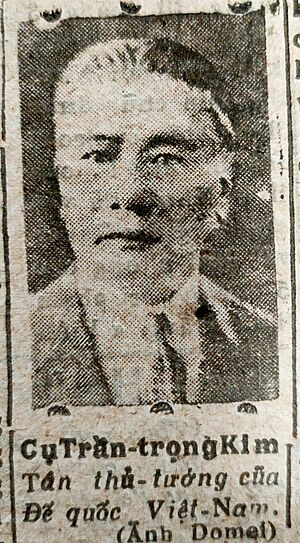Trần Trọng Kim facts for kids
Quick facts for kids
Trần Trọng Kim
|
|
|---|---|
 |
|
| Prime Minister of the Empire of Vietnam | |
| In office 17 April 1945 – 25 August 1945 |
|
| Monarch | Bảo Đại |
| Preceded by | Position established |
| Succeeded by | Phan Anh Hồ Chí Minh (as prime minister of DRV) |
| Personal details | |
| Born | 1883 Nghi Xuân, Hà Tĩnh, Annam |
| Died | 2 December 1953 (aged 70) Đà Lạt, State of Vietnam |
| Spouse | Bùi Thị Tuất |
| Children | Trần Diệu Chương (daughter) |
| Profession | Scholar, educator |
Trần Trọng Kim (Chữ Nôm: 陳仲金; 1883 – December 2, 1953) was a Vietnamese scholar and politician. He served as the Prime Minister of the Empire of Vietnam in 1945. This state was created with the help of Japan during World War II. Japan had taken control of Vietnam from the French.
Contents
Early Life and Education
Trần Trọng Kim was born in 1883 in Nghi Xuân, a place in central Vietnam. At that time, Vietnam was under French rule, part of what was called French Indochina. His home province, Hà Tĩnh, was known for its history of people fighting for their country's freedom.
Even though there were fights against French rule, Kim studied in schools in Hanoi that were for the ruling class. He then worked for the French government as an interpreter. In 1905, he went to France to work for a company.
Later, in 1908, he received a scholarship to train as a teacher in France. He returned to Vietnam in 1911 and began his career as a teacher. He slowly moved up in the education system. By 1942, he was an inspector for elementary schools in northern Vietnam. He also wrote many books about teaching.
A Respected Scholar
While working as an education official, Kim became very well known as a scholar. He wrote many textbooks in the Vietnamese alphabet. He was especially famous for his writings on Confucianism, Buddhism, and Vietnamese history.
His two most famous books are Việt Nam sử lược (A Brief History of Vietnam), published in 1920, and Nho giáo (Confucianism), published between 1929 and 1933. In A Brief History of Vietnam, Kim showed how much Chinese culture influenced Vietnamese society. His book on Confucianism explored this philosophy in China and its effects on Vietnam. Kim greatly admired Confucianism, and his book led to many discussions about its role in Vietnamese society.
Because of his strong reputation in writing, Kim became a leader in Buddhist and Confucian groups. In 1939, he was chosen to be part of the Chamber of People's Representatives in northern Vietnam. He also received an important French award called the Legion of Honour.
World War II and Leadership

During World War II, Japan expanded its control in Asia. In 1940–1941, Japan took over Indochina, which included Vietnam. At this time, France was controlled by Nazi Germany, and the French government in Vietnam was loyal to a French government that worked with Germany. Since this French government was allied with Japan, the French still managed daily life in Indochina, but Japan was in charge.
Many Vietnamese people in the early 1900s saw Japan as a country that supported Asian independence. Because of this, many Vietnamese who wanted their country to be free traveled to Japan. Trần Trọng Kim was contacted by Japanese experts who studied Vietnam. These contacts made the French government suspicious of Kim.
In 1943, Japanese agents took Kim to their office in Hanoi to protect him. He later traveled to Singapore and then to Bangkok. In March 1945, Japan unexpectedly called him back to Vietnam.
By this time, France was no longer allied with Germany. Japan could no longer rely on the French to help them. So, on March 9, Japan took direct control of Indochina. They removed the French government and declared Vietnam independent. This new state was called the Empire of Vietnam, and Bảo Đại, the former emperor, became its leader. Japan, however, still held military control.
Emperor Bảo Đại was tasked with choosing a prime minister and a government. When Kim arrived in Vietnam, he met with Japanese military leaders. They told him that Emperor Bảo Đại wanted to meet with him in Huế to discuss forming a new government.
Kim met with Bảo Đại on April 7. At first, Kim did not want to be prime minister. He said he was too old and did not have a political party. However, after more talks, he agreed to form a new government on April 16. The next day, he presented his list of ten ministers. Most of his cabinet members had been educated in French schools but were considered Vietnamese nationalists.
Short Time in Power
Trần Trọng Kim was prime minister for only about five months. Most of his plans could not be put into action because his government fell apart after Japan lost World War II. After his government ended, Kim went back to his studies and academic work.
Some people debate whether Kim was simply a "puppet" of Japan. Others believe that Kim and his government members were scholars and experts who simply tried to help their country during a difficult time.
 | Janet Taylor Pickett |
 | Synthia Saint James |
 | Howardena Pindell |
 | Faith Ringgold |

